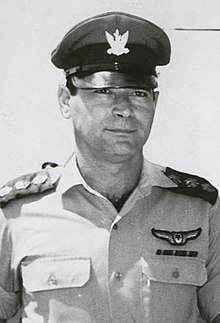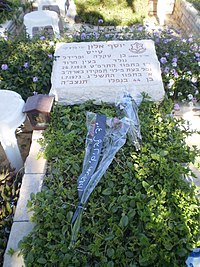Yosef Alon
Yosef Alon | |
|---|---|
 | |
| Born | July 25, 1929 Ein Harod, Mandatory Palestine |
| Died | July 1, 1973 (aged 43) Chevy Chase, Maryland, U.S. |
| Allegiance | Israel |
| Service | |
| Years of service | 1949–1973 |
| Rank | Colonel |
| Commands | 101 Squadron Hatzerim Airbase |
| Other work | Assistant Air and Naval Attaché to U.S |
Yosef (Joe) Alon (Hebrew: יוסף (ג'ו) אלון), born Josef Plaček (July 25, 1929 – July 1, 1973), was an Israeli Air Force officer and military attache to the U.S. who was shot and killed in the driveway of his home in Chevy Chase, Maryland.[1]
Early life
[edit]Alon was born Josef Plaček on kibbutz Ein Harod to Jewish immigrants from Czechoslovakia, Siegfried 'Friedl' and Thekla Plaček. When he was two, his family returned to Czechoslovakia, where they settled in Teplice, in the Sudetenland. Following the 1938 Munich Agreement, which resulted in the annexation of Sudetenland to Nazi Germany, Alon and his family moved to Prague.
On the eve of World War II, Alon's father sent 10-year-old Josef and his elder brother David to the United Kingdom as part of the Kindertransport program. He was then adopted by George and Jenny Davidson, a childless Christian couple.
Most of his family was wiped out during the Holocaust, with his parents being murdered at Auschwitz. Following the war, he returned to Czechoslovakia and attempted to start a career as a jeweler.[when?] He then graduated from a vocational school, and then enlisted in the Czechoslovak Air Force, where he successfully completed a pilot course.[when?]
Family
[edit]Alon married Dvora Alon (née Kirat), a Jewish immigrant from Yemen, in January 1954.[clarification needed] They had three daughters; Dalia (born 1954), Yael (born 1959), and Rachel (born 1968).
IAF career
[edit]In 1947, he volunteered for the first pilots' course in the Sherut Avir,[clarification needed] the Haganah's nascent air corps. Soon afterward, he moved back to Mandate Palestine, changed his name to Yosef Alon, and upon Israeli independence in 1948, was among the founding members of the Israeli Air Force (IAF).[2]
Alon fought in the 1948 Arab–Israeli War as a fighter pilot and early member of the nascent IAF, and would go on to complete 75 missions. In 1953, he became one of Israel's first jet pilots. From 1953 to 1956, he flew Gloster Meteor and Dassault Ouragan aircraft in the IAF.[citation needed]
From August 1960 to August 1961 Alon served as a Mystère IV pilot and as Commander of the 101 Squadron, which was equipped with Mystère IV aircraft. In November 1961, he returned to command 101 Squadron as the IAF's first Mirage III squadron. In 1965, after attending a command and training course in England, Alon went on to head the Air Force safety industry. The highlights of his career in the IAF was the establishment of the Flying Safety branch and the Hatzerim Airbase, which he commanded from 1966 to 1970.[citation needed]
In 1970, then a colonel, Alon was chosen to be the assistant air and naval attache at Israel's Embassy in Washington, DC.[3] Installed in what should have been a three-year assignment, Alon advocated strongly on Israeli arms procurement, especially regarding the F-4 Phantom.[citation needed] He also established close relationship with the American Jewish community, assisted with the activities of the United Jewish Appeal, and gave lectures to students on Israel's cause.[citation needed]
Assassination
[edit]
On the night of June 30, 1973, 44-year-old Yosef Alon and his wife Dvora went to a dinner party for a departing Israeli embassy staffer.[4] At roughly 12:30 am on July 1, the couple entered their Ford Galaxie and drove home to Chevy Chase, Maryland, arriving about a half-hour later. Dvora exited the vehicle and walked 20–30 feet to their porch, while Alon gathered up his sports jacket on the back seat.[5][4]
At this moment Alon was shot in his chest five times with copper-jacketed military bullets by a foreign-made .38 caliber revolver, either an F.I.E. Titan Tiger or a German Arminius.[dubious – discuss] One shot that pierced his heart would soon prove to be fatal, while the other shots caused only minor wounds.[6][5][4] Dvora rushed inside and called the police, seeing only a light-colored car drive away, and then returned to the front yard.[5][4] She attempted with her 18-year-old daughter Dahlia to stem his bleeding with towels.[4] Alon was taken to a hospital, where he died at 1:27 am.[7]
Aftermath
[edit]Alon's family accepted President Richard Nixon’s offer to repatriate Alon's body to Israel onboard an USAF C-137 Stratoliner. The aircraft left the US from Andrews Air Force Base in Maryland, arriving at Lod Airport in Tel Aviv, with his family onboard.[citation needed]
Alon is buried with full military honours at Kiryat Shaul Military Cemetery.[citation needed]
Palestinian claim
[edit]Later on July 1 the Cairo-based Voice of Palestine[dubious – discuss] broadcast that "After the assassination of martyr Mohammed Boudia[8] at the hands of the Zionist intelligence elements in Paris, Colonel Yosef Alon... was executed... His is the first execution operation carried out against a Zionist official in the U.S."[6]
US investigation
[edit]
The FBI investigation, "Murder of Assistant Air Attache Col. Joseph Alon" (MURDA), quickly focused on a possible link with Arab terrorism, including following leads given by the Shin Bet, but was ultimately closed in March 1976 without discovering the perpetrators, according to the Associated Press. Sometime later, the CIA was reported to have been told by a "Fedayeen senior official" that on the orders of Black September, two students, using Lebanese or Cypriot passports, had passed across the Canada–US border and come to Washington, where, with the help of a local professor, they had rented a car and got the weapons for the assassination. Afterwards, the students were reported to have abandoned the rental for another, which they used to get to Dulles International Airport; from there they flew on to the West Coast of the United States, East Asia, and finally the Middle East. This information was passed to the FBI in February 1977, but they could make no new progress, and the investigation was closed. The following year, the collected evidence for the case was destroyed by the Baltimore office of the FBI.[citation needed]
Dvora Alon died in 1995 without knowing the identity of her husband's killer.[10]
Theories
[edit]Black September
[edit]In his book Chasing Shadows (Palgrave Macmillan), Fred Burton, former deputy chief of the counterterrorism division of the U.S. State Department's Diplomatic Security Service and vice-president of the private intelligence and consulting firm Stratfor, concluded after a lengthy investigation that Alon's killer was an agent from Black September who was killed by Mossad in 2011.[7]
Israeli agents
[edit]The documentary film Who Shot My Father? The Story of Joe Alon by Liora Amir Barmatz aired on the First Channel in Israel in April 2011. The historian Uri Milstein and Colonel Yakov Agassi presented a theory which said that Alon had been assassinated because he unwillingly learned about the conspiracy theory (the Kissinger plan) for the Yom Kippur War, which involved collusion between the US, Israel, and Egypt and was designed to allow entry for the US into the region as a "savior" (and future power broker) for both Israel and Egypt by stopping the fighting after previously agreed-upon objectives had been achieved.[citation needed] Ezer Weizman claimed that "Jo was killed because he knew something he should not know about." The film also claimed that general Shmuel Gonen had said to journalist Adam Baruch, who wrote in his book that he was killed "by one of our own" because he knew something he should not know about. Professor Uri Bar-Joseph has rejected the theory and the findings.[11]
Renewed investigation
[edit]Due to a lead developed years earlier by journalist Adam Goldman, the FBI reopened the case in January 2017.[12] The new investigation involves information recently given to an agent by Venezuelan terrorist Carlos the Jackal, that sometime after 1970 three American veterans sympathetic to the Palestinian cause,[13] one of them a "prominent former Black Panther," approached Mahmoud Ould Saleh, a Mauritania-born manager of the Arabic Bookshop on the Rue Saint Victor in the Latin Quarter of Paris and member of the extremist Palestinian "rejection front" (killed in 1977.)[14][15] Saleh put them in touch with suspected Black September militant Kamal Kheir Beik (later killed), known to have managed terror attacks including the 1975 OPEC siege.[13] Every sale of the gun identified as the murder weapon, a .38-caliber revolver, that was sold east of the Mississippi, has previously been identified by the FBI, which is now tracing the purchasers of those guns.[13][clarification needed]
See also
[edit]- Lists of unsolved murders
- List of incidents of political violence in Washington, D.C.
- List of attacks against Israeli embassies and diplomats
References
[edit]- ^ "Assassins Unknown: CIA, FBI documents provide clues to 1973 killing of Israeli diplomat". Associated Press. June 27, 2007. Retrieved March 2, 2009.
- ^ Melman, Yossi (April 1, 2011). "Who killed Joe Alon?". Haaretz. Retrieved December 29, 2021.
- ^ Goldman, Adam; Herschaft, Randy (July 1, 2007). "Papers shed light on envoy's '73 killing". The Boston Globe. Associated Press. Retrieved March 2, 2009.
- ^ a b c d e Goldman, Adam; Herschaft, Randy (June 28, 2007). "CIA, FBI documents provide clues to 1973 killing of Israeli diplomat". Taiwan News. Retrieved December 29, 2021.
- ^ a b c Goldman, Adam; Herschaft, Randy (September 27, 2019). "Files call for heating up cold case of '73". Tulsa World. Associated Press. Retrieved December 29, 2021.
- ^ a b Gwertzman, Bernard (July 2, 1973). "Israeli Attache Shot Dead At Home Near Washington". The New York Times. Retrieved December 29, 2021.
- ^ a b Lev, David (December 10, 2011). "Was Alon Killed Because He 'Knew Too Much?'". Israel National News. Retrieved December 29, 2021.
- ^ Boudia was killed that June 28. For more see Mossad assassinations following the Munich massacre.
- ^ "About the Joe Alon Center". Archived from the original on January 19, 2012. Retrieved September 11, 2011.
- ^ Goldman, Adam; Herschaft, Randy (June 30, 2007). "Family's Long Battle to Find Alon Killer". Fox News. Retrieved March 2, 2009.
- ^ "מה שאסור לערוץ ממלכתי". Haaretz (in Hebrew). April 12, 2011. Retrieved July 15, 2019.
- ^ Aderet, Ofer (January 9, 2017). "FBI Reopens Israeli Military Attaché Assassination Case, NYT Reports". Haaretz. Retrieved July 15, 2019.
- ^ a b c Goldman, Adam (8 January 2017). "I Wrote to Carlos the Jackal, and an Israeli's Assassination Case Was Revived". New York Times. Retrieved 10 January 2017.
- ^ "PLO Accuses 'Zionist Agents' of Killing Palestinian Militant". JTA. 5 January 1977. Retrieved 10 January 2017.
- ^ "Former PLO Aide Killed Leaving Bookstore". NewYorkTimes. 4 January 1977. Retrieved 10 January 2017.
Further reading
[edit]- Burton, Fred and John Bruning (2011). Chasing Shadows: A Special Agent's Lifelong Hunt to Bring a Cold War Assassin to Justice. Collegeville, MN: Palgrave Macmillan. ISBN 978-0-230-62055-1.
External links
[edit]- 1929 births
- 1973 deaths
- 1973 murders in the United States
- 20th-century diplomats
- 20th-century Israeli Jews
- Assassinated Israeli diplomats
- Assassinated Jews
- Assassinated Israeli military personnel
- Deaths by firearm in Maryland
- Israeli Air Force personnel
- Israeli expatriates in the United States
- Israeli military aviators
- Israeli military personnel of the 1948 Arab–Israeli War
- Israeli murder victims
- Israeli people of Czech-Jewish descent
- Air attachés
- Israeli military casualties
- Unsolved murders in the United States
- Israeli people murdered abroad
- People murdered in Maryland
- Burials at Kiryat Shaul Cemetery
